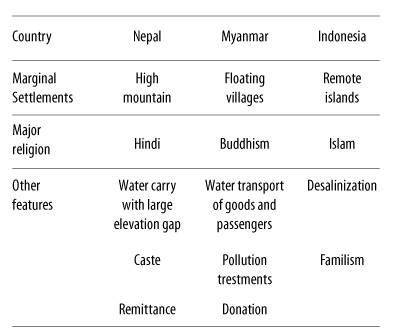Water-Energy-Nexus Technology for Marginal Settlements: Socially Optimal Size from the Perspectives of Reciprocity and Indigenous Knowledge
KANEKO Shinji
Hiroshima UniversityArea : Nepal, Myanmar, Indonesia

Brief profile of study areas
This project attempts to identify the optimal scale of community infrastructure that can improve water and energy supplies in marginal settlements. The project is motivated by the Solar Water Pumping Systems (SWPS), which have been expanding to marginal settlements in the deep mountains of Nepal. While the capital cost of such community-scale projects can be relatively low, when scaled-up for larger social contexts, such projects increase social transaction costs of decision-making and operation, as they require comprehensive consideration of education, religion, social class, and social norms. This project investigates the tradeoffs surrounding community infrastructure works in three different types of marginal settlements: (1) high mountain villages in Nepal; (2) “floating people” of Inlay Lake, Myanmar; and (3) small remote islands in Indonesia.
▲PAGE TOP